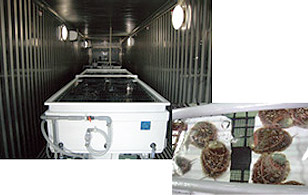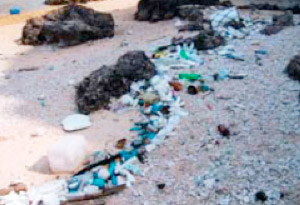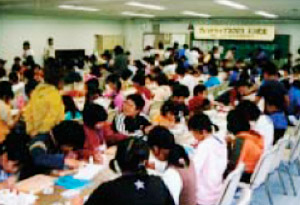Studies on Coastal Zone Management and Marine Environment
Research and Development for Land-based Abalone Aquaculture System Using Refrigerated Ship Containers, Research and Study on the Debris Problem in the Oceans and Coastal Zones
Research and Development for Land-based Abalone Aquaculture System Using Refrigerated Ship Containers
 A Land-based Abalone Aquaculture System in a Refrigerated Ship Container
A Land-based Abalone Aquaculture System in a Refrigerated Ship ContainerIn the past, Japan's aquaculture was concentrated mainly in bays, but with the red tide phenomenon operations began to be moved to cleaner environments offshore. However, worsening water quality in both bay and offshore environments due to organic and food waste, along with increasing maintenance and equipment costs, has brought continued decline to the industry since its peak in 1985.
At OPRF (now OPRI) we undertook research for the development of an environmentally friendly yet cost effective land-based abalone aquaculture system. The system we devised is composed of a compact easy-to-use cultivation bed and filtering tank inserted into used refrigerated ship containers. The simplicity of design and materials used in the Land-based Abalone Aquaculture System (SOF Aquaculture System) keeps initial investment and running costs low. We are continuing to refine the system toward making it available for wide practical application.
Research and Study on the Debris Problem in the Oceans and Coastal Zones
Ocean debris drifting on the seas and onshore is not only unsightly and ecologically detrimental, but is now expanding into a global problem. To solve this problem, it is necessary to have not only a unified management system for land and sea areas but also a social activity system to solve the local debris problems in cooperation with the public and private sectors.
OPRF (OPRI) has carried forward popularization of a "local action system contributing to conservation of the marine environment" by introducing environment vouchers for seashore cleaning and debris craft workshops. This has been done in cooperation with citizen groups nationwide. In February 2005, those from nine areas of the country who had engaged in community activities gathered in Tokyo for an exchange conference, where they presented case studies and exchanged opinions. It is anticipated that the “action system” that OPRF presented as a model will be expanded into other areas.
 Trash Scattered on the Beach
Trash Scattered on the Beach An "Ocean Classroom" after a Beach Clean-up
An "Ocean Classroom" after a Beach Clean-up